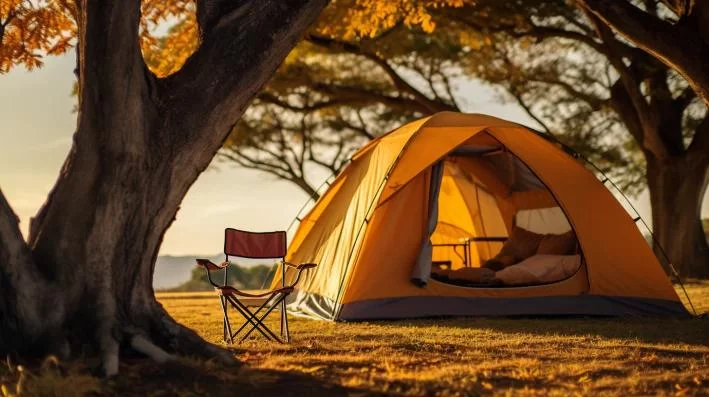Learn how to camp without electricity and still be comfortable with these essential tips. From off-grid camping hacks to cozy alternatives, discover practical advice for a memorable and enjoyable camping experience.

How to Camp Without Electricity and Still Be Comfortable: Essential Tips for an Enjoyable Experience
- 1. Plan Your Campsite with Comfort in Mind
- 2. Embrace Natural Light and Warmth
- 3. Choose the Right Gear for Comfort
- 4. Cooking Without Electricity: Simple and Delicious Ideas
- 5. Stay Comfortable in All Weather
- 6. Personal Experience: How I Survived a Weekend Without Electricity
1. Plan Your Campsite with Comfort in Mind
When planning your camping trip, especially when you won’t have access to electricity, it’s crucial to think ahead about your campsite setup. Choosing the right location can make a huge difference. Look for a spot that offers natural shelter from the wind and is located near fresh water sources. A flat area with natural shade will help keep you cool during the day while offering shelter from the night chill.
Strategic Shelter Placement
Setting up your tent near trees or tall grasses can give you protection from the elements. Additionally, placing your tent away from direct sunlight in the afternoon can help maintain a cool environment when the temperature rises. If you’re camping in a colder climate, opt for a location that’s sheltered from strong winds.
2. Embrace Natural Light and Warmth
Without electricity, it’s important to rely on natural sources of light and warmth. The sun is your best friend during the day! Invest in a high-quality, portable solar-powered lantern or headlamp for after dark. For added coziness, you can also use candles or LED lights that require no batteries and give off a soft, warm glow.
Maximize Sunlight During the Day
During daylight hours, use the sun’s energy to your advantage. Let natural light into your tent by keeping the flaps open (while ensuring privacy and safety). A solar-powered fan or charger can be invaluable for keeping devices charged and ventilating your tent.
3. Choose the Right Gear for Comfort
The key to enjoying a camping experience without electricity is selecting the right gear. It’s easy to assume that modern camping requires electricity, but with a few thoughtful tools, you can make your experience comfortable and stress-free. Here are some essentials:
- Portable Solar Power Stations – These devices can charge phones, lights, and small electronics. They’re especially useful if you plan to stay in a campsite for several days.
- Battery-Powered Fans – A battery-powered fan is a lifesaver during hot weather, providing a breeze without needing power outlets.
- Insulated Sleeping Bags – When camping without electricity, temperatures can drop unexpectedly, so invest in a high-quality sleeping bag to stay warm.
4. Cooking Without Electricity: Simple and Delicious Ideas
Cooking without electricity doesn’t mean you have to settle for bland, uninspiring meals. With a few simple tools, you can prepare delicious, hearty dishes right at your campsite. A portable camp stove or a campfire is your best option for cooking meals.
Cook Over the Fire
Campfire cooking can be a fun and rewarding experience. Try roasting marshmallows or grilling vegetables. You can even cook more elaborate meals like chili, stews, and grilled meats using a cast-iron skillet over the fire. A campfire also helps create a cozy atmosphere at night.
Portable Cooking Tools
If you don’t want to rely on a campfire, a small portable stove powered by butane or propane is another great option. It’s easy to use and doesn’t require electricity, making it perfect for off-grid cooking.
5. Stay Comfortable in All Weather
One of the biggest challenges when camping without electricity is managing your comfort in varying weather conditions. You don’t want to freeze at night, nor do you want to swelter during the day. Here are a few tips for staying comfortable:
Stay Warm in Cold Weather
Pack extra layers of clothing, including thermal socks, gloves, and a hat. Use sleeping pads under your sleeping bag for insulation from the cold ground. You can also bring along hand warmers or heated blankets that don’t require electricity.
Stay Cool in Hot Weather
In hot climates, wear light-colored, breathable clothing to stay cool. Set up your tent in a shaded area to avoid the heat of the sun, and drink plenty of water. A portable solar-powered fan can be a game-changer when temperatures rise.
6. Personal Experience: How I Survived a Weekend Without Electricity
On a recent camping trip in the backwoods of the Pacific Northwest, I faced the challenge of camping without electricity for three days. It was both thrilling and daunting at first. I remember how strange it felt to not have my phone constantly charging or to rely on ambient lighting after dark.
My Approach to Comfort
For this trip, I made sure to plan my campsite carefully. I chose a secluded spot near a stream, surrounded by trees for shade. I invested in a portable solar panel charger, which kept my camera and phone charged just enough to snap photos and check maps when needed. At night, I used a solar lantern to light my way to the campfire, where I roasted marshmallows and cooked a simple but delicious stew in a cast-iron pot. The lack of electricity made everything feel more connected to nature, and I found myself more relaxed, enjoying the simplicity of the outdoors.
Key Takeaways from My Experience
One of the most rewarding aspects of this trip was how much I relied on creativity and resourcefulness to make the experience enjoyable. The lack of electricity pushed me to engage more with my surroundings and embrace a slower, more mindful way of living. If you're considering camping off-grid, I highly recommend it!
River Pointe Campground & Marina
360 Water St, Etters, PA 17319, USA
Visit Location PageSun Retreats Sandbanks
37 Lake Ave Ln, Cherry Valley, ON K0K 1P0, Canada
Visit Location Page